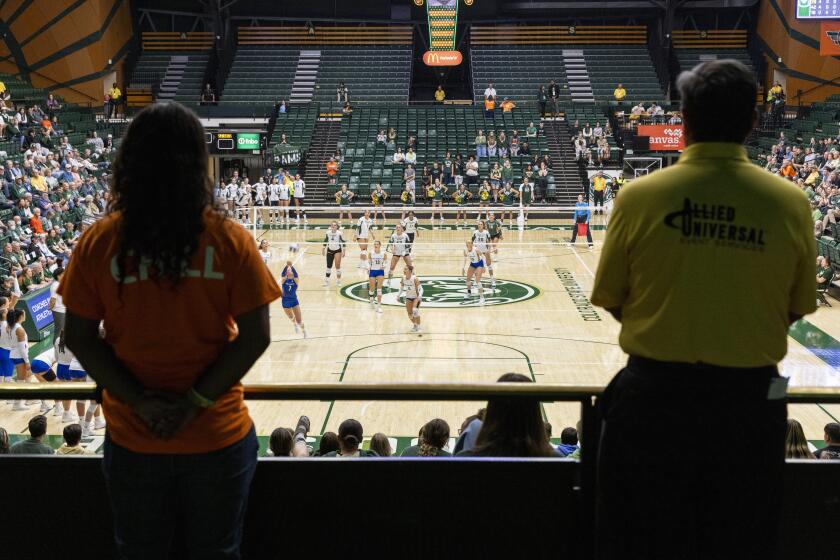Serena Williams is at center of U.S. tennis story
LONDON — So, you’ve never been clear how much our pro tennis players embrace the Olympics, how much they love squeezing in another long plane flight every four years for more three-hour matches.
Let us take you there.
Tuesday at the main Olympic media center here, they paraded in the U.S. team, fresh from the flight that took them across the pond. Like the tennis balls they hit for a living, they were a bit fuzzy.
Liezel Huber, once a South African, now a U.S. citizen, and one of the top women’s doubles players in the world, summed it up nicely.
“We all need showers,” she said.
When they got settled on the long dais needed for 12 players and two coaches, the seating chart, certainly not a random happening, had Serena Williams in the center and the others spread left and right. It was the queen and her court.
She is the story and most likely will be, until the day she retires. She will be 31 in September, just won her fifth Wimbledon title a few weeks ago and tube stops away, and now will seek a milestone in these Games that would give her an even loftier spot in the sport’s lore.
If she wins the women’s singles here, she will be the first to win each tennis Grand Slam event —Australian, French, Wimbledon and U.S. Open — at least once, plus an Olympic gold in both singles and doubles. She has done all but the Olympic singles.
For a while, there were only two achieving a lifetime Golden Slam, and they are married to each other — Steffi Graf and Andre Agassi. Graf, of course, actually achieved it all in one year, 1988, wrapping up her incredible run at the Seoul Olympics. Agassi got his Olympic gold at Atlanta in 1996. At the Beijing Olympics, Rafael Nadal joined Mr. and Mrs. Agassi in the select group by winning the singles gold. Serena, who has won Olympic gold in doubles twice with sister Venus, lost in the singles semifinals to Elena Demetieva.
There have been others close to reaching this somewhat odd tennis height. Tennis was contested in the Olympics from 1900 to 1924, and then dropped from the program until 1988 in Seoul. However, early-century players seldom went to Australia.
Helen Wills won both a singles and doubles gold in Paris in 1924, and had 24 total titles in the U.S. and French Opens and Wimbledon, but never played in the Australian. Lindsay Davenport won her Olympic gold in Atlanta, but never won a French Open. Justine Henin won gold in Athens, but never won at Wimbledon. Venus Williams has Olympic gold in singles and doubles and titles at the U.S. Open and Wimbledon, but none in Australia and the French.
Then, there is Roger Federer, who has all the major titles and Olympic gold, except his gold is in doubles, at Beijing with Stanislas Wawrinka. If Federer and Serena win the gold singles here, they will actually move a notch above the rest with four majors each, plus Olympic singles and doubles gold.
Pretty heady stuff, right? Serena Williams, when presented with the scenario, was either jet-lagged or unmoved by history.
“I don’t think I knew that,” she said. “Thanks. No pressure.”
With Serena, you never know whether she is being cagey or is really oblivious.
She continued with the usual programmed propaganda.
“It’s great just to be here and to represent our country,” she said. “The important thing is to do the best I can for the U.S.”
She was asked about her attendance at the opening ceremony, a question that always seems to be a staple when prominent U.S. pro athletes come to the Olympics. With Serena, the answer carried additional import because there have been stories advocating that she be the U.S. Olympic flag-bearer.
That, of course, would be a terrible idea — the flag bearer should be somebody outside the prominence of U.S. pro sports who has a compelling story (the Lost Boy of Sudan Lopez Lomong at the Beijing Games) or some Olympic longevity in a sport that doesn’t make them a zillionaire elsewhere (shooter Kim Rhode?).
But Serena pretty much took herself out of the running, anyway. She called her past experiences in the opening ceremonies something that evoked “an unbelievably brilliant feeling,” but said that it all depended on what her playing schedule was. The tournament starts the day after Friday’s opening ceremony and she said she would not march if she had a match the next day.
“This year, it is a bit tricky,” she said.
Other highlights included Andy Roddick’s admission that he is lots more excited about an Olympics here, on Wimbledon’s grass, than he would be for other sites on slower surfaces. Roddick has made it to the Wimbledon final three times.
John Isner, now the top-ranked U.S. men’s player and making his Olympic debut, was asked about his expectations here. He responded, with humor, that he had gotten on a plane immediately after playing in a World TeamTennis match for the Boston Lobsters on Monday night and said, “The atmosphere at a Lobsters match is second to none.”
Women’s team coach Mary Joe Fernandez said her team was good enough to “win medals in all categories.” Men’s coach Jay Berger didn’t speak. Nor did the Bryan brothers, doubles stars Mike and Bob. They were detained at the airport because of a minor accreditation glitch.
At the end, the media were informed that this would be the last availability for the U.S. team until after matches. That meant the athletes could file out of the room, still foggy, but happier.
More to Read
Go beyond the scoreboard
Get the latest on L.A.'s teams in the daily Sports Report newsletter.
You may occasionally receive promotional content from the Los Angeles Times.











